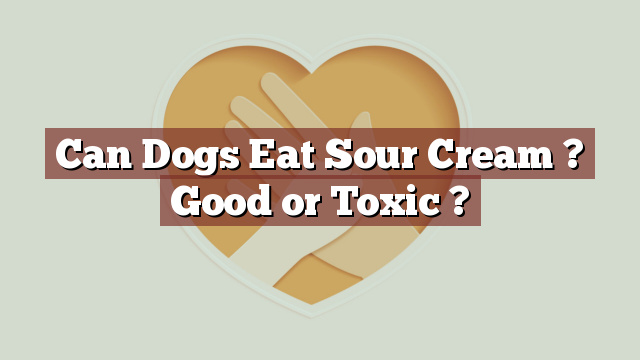Can Dogs Eat Sour Cream? Good or Toxic?
Knowing what foods are safe for our pets is essential in ensuring their health and well-being. Our furry friends often have different dietary needs than we do, and it’s important to be aware of what they can and cannot eat. One food that may raise questions for dog owners is sour cream. Is it safe for dogs to consume? Let’s explore the nutritional value, safety, potential risks, and benefits of feeding sour cream to dogs.
Nutritional Value of Sour Cream for Dogs: Key Facts
Sour cream is a popular dairy product widely used in cooking and baking. It is made by fermenting regular cream with lactic acid bacteria. While sour cream contains some beneficial nutrients, it is important to note that it is also high in fat and calories. In small amounts, sour cream can provide dogs with essential vitamins, minerals, and protein. However, excessive consumption can lead to weight gain and other health issues.
Can Dogs Eat Sour Cream? Safety and Toxicity Explained
Can dogs eat sour cream? The answer is yes, but with caution. While sour cream itself is not toxic to dogs, its high fat content can pose health risks if consumed in large quantities. Dogs have a more difficult time digesting fat compared to humans, which can lead to digestive upset, pancreatitis, and even obesity. Additionally, some dogs may be lactose intolerant and experience gastrointestinal discomfort after consuming dairy products like sour cream.
Potential Risks and Benefits of Feeding Sour Cream to Dogs
Feeding your dog sour cream in moderation can have some potential benefits. The calcium and protein found in sour cream can contribute to bone health and muscle development. However, these benefits can be obtained from other, less fatty sources. It is important to note that the risks associated with feeding sour cream to dogs outweigh the potential benefits. The high fat content can lead to weight gain, which can increase the risk of other health issues such as diabetes and cardiovascular problems.
What to Do If Your Dog Eats Sour Cream: Steps to Take
If your dog accidentally consumes a small amount of sour cream, there is usually no cause for alarm. However, if your dog ingests a large amount of sour cream or exhibits any signs of discomfort, it is important to take action. Keep an eye out for symptoms such as vomiting, diarrhea, or abdominal pain. If these symptoms persist or worsen, it is best to consult your veterinarian for further guidance.
Conclusion: Moderation and Consultation are Key when Feeding Sour Cream to Dogs
While dogs can technically eat sour cream, it is not recommended due to its high fat content and potential risks. Feeding your dog sour cream in moderation and as an occasional treat is acceptable, but it should never be a regular part of their diet. If you are unsure about whether a particular food is safe for your dog, it is always best to consult with your veterinarian. They can provide you with tailored advice based on your dog’s specific nutritional needs and health considerations. Remember, the key to a healthy and happy dog is a balanced and appropriate diet.
Thank you for investing your time in exploring [page_title] on Can-Eat.org. Our goal is to provide readers like you with thorough and reliable information about various dietary topics. Each article, including [page_title], stems from diligent research and a passion for understanding the nuances of our food choices. We believe that knowledge is a vital step towards making informed and healthy decisions. However, while "[page_title]" sheds light on its specific topic, it's crucial to remember that everyone's body reacts differently to foods and dietary changes. What might be beneficial for one person could have different effects on another. Before you consider integrating suggestions or insights from "[page_title]" into your diet, it's always wise to consult with a nutritionist or healthcare professional. Their specialized knowledge ensures that you're making choices best suited to your individual health needs. As you navigate [page_title], be mindful of potential allergies, intolerances, or unique dietary requirements you may have. No singular article can capture the vast diversity of human health, and individualized guidance is invaluable. The content provided in [page_title] serves as a general guide. It is not, by any means, a substitute for personalized medical or nutritional advice. Your health should always be the top priority, and professional guidance is the best path forward. In your journey towards a balanced and nutritious lifestyle, we hope that [page_title] serves as a helpful stepping stone. Remember, informed decisions lead to healthier outcomes. Thank you for trusting Can-Eat.org. Continue exploring, learning, and prioritizing your health. Cheers to a well-informed and healthier future!

